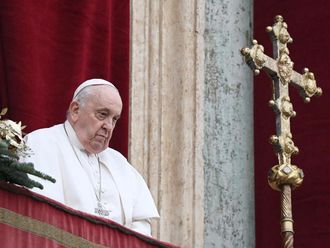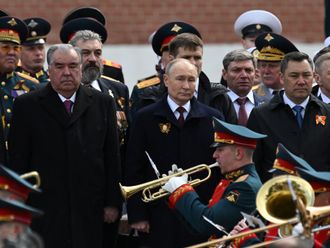The French aviation sector has built a strong reputation in aircraft technology.
When French Aviators Dieudonne Costes and Maurice Bellonte took the world's first non-stop flight from Paris to New York in 1930, they never imagined the leap that the French aviation industry would make from that day.
The event is hailed as one of the world's great aeronautical triumphs and speaks about the competence of French aviation.
Jean-Paul Boutibou has been associated with the French aviation industry for more than 15 years. He started out with the French airline, UTA, and then moved on to assisting Airbus by promoting its sales network in the Middle East. He subsequently created Abjad, an asset management company whose principal activities deal with re-marketing, leasing and trading large and regional commercial aircraft.
He says, " France has made a global impact on the aviation industry from the first flight of Clement Ader in 1900 to the construction of the Concorde, and this is today visible by the fact that most of the civil aircraft in the world are being built or assembled in Toulouse in the south of France. These aircraft are then directly exported from France to the rest of the world."
"The aviation industry is also making a huge impact on the French economy since it generates avenues for employment. There are many different locations throughout France that concentrate on aviation. When a company expands, it needs to hire more people and bring in some expertise from outside. This impacts recruitment. Simultaneously this has an impact on the local economy," says Boutibou.
The fact that Airbus has been developing civil aircraft for the past 30 years and is at a competitive level with those around the world is a big boon to French economy. Boutibou says, "In order for the aviation industry to be more proactive, the French government has decided to streamline some of its sectors and create regions that concentrate on aviation. Aquitaine and Midi Pyrenees are the two French regions where the main industry is aeronautics."
"Historically both Toulouse and Bordeaux have witnessed the birth of aeronautics. By offering incentives for suppliers and sub contractors to move to these two locations, the government is bettering prospects for not only the region but also the country at large, which has a huge impact on the regional and national economy as well.
"There are only two large civil aircraft manufacturers in the world ? Boeing and Airbus. As more aircraft are sold, this has a direct impact on production, and this also means more revenue for the subcontractors and different suppliers. This also led Air France to de- localise a highly sophisticated and efficient maintenance, repair and overhaul facility to Toulouse in order to be on the doorsteps of the Airbus manufacturing line," says Boutibou.
Bordeaux hosts a company called Sogerma, whose activities are centred in aircraft outfitting, aircraft seats and galley manufacturing and maintenance, repair and overhaul. Socata is another aircraft manufacturer based in Tarbes, which builds single engine and other private aircraft.
Boutibou says, " France has also been a major player in military aircraft with Dassault and Aerospatiale playing major roles, the latter having also developed the helicopter segment today known as Eurocopter. "The relationship between the UAE and France is not only limited to the civil sector but also to the military division. A strong political bond between the two countries facilitates exchange of expertise on this aspect as well."
Boutibou says that the growth of the Emirates fleet has been based on Airbus airplanes. He says this is because "Emirates airline has believed in the capabilities of the French aviation industry."
Air France is the country's main scheduled airline. It possesses an extensive network around the world and has played an important part in linking different regions, particularly the Middle East to the rest of the world.
The airline recently added five weekly flights on the Dubai-Paris-Dubai route, raising the total from seven to 12 and offering passengers a choice of a day and a night flight ? an indication of its influence in the region. Bernard Aubreton, General Manager of Air France, says, "We are one of the first international airlines to operate from the Middle East and celebrated 30 years of service in the region.
"One of our biggest strengths is that we have managed to project Paris as a major hub for the rest of the world." Air France connects Paris to about 200 locations around the world.
"Everyone knows that the air transport industry has gone through a crisis largely due to calamities that occurred as a result of September 11. Since then we have recovered and developed at a rapid pace," says Aubreton.
Air France is projected as a business carrier. Aubreton believes this is an image that has helped it cater to a niche segment, while continuing to offer services to other segments as well. "Though business travellers are our core clients, this doesn't mean we don't offer the best of our service to other travellers. We have in fact increased our capacity by including the Boeing 777, a larger aircraft that facilitates the flow of traffic. The world sees Air France as a carrier that is committed to quality service."
Aubreton believes the French aviation industry has direct relevance for the UAE as a number of French companies are active in the region. These are largely companies that deal with the oil and gas sector though the small and medium-sized companies have also made their mark here. Dubai is also a major centre for convention-related business, which is why air travel to the region is particularly important.
Aubreton says, "The aviation industry worldwide is always trying to cope with fierce competition along with external pressures such as the cost of fuel. The smaller carriers can barely survive without joining alliances. The strong development of low cost carriers in Europe has changed the face of aviation and is pushing development in its own way. Low-cost airlines are definitely bringing more travellers to the industry who are further developing the interest in the aviation sector." He says that Air France is widening its capacity by focusing on developing markets such as India, Brazil and China.
France is one of the leading countries for civil aviation. Aubreton says, "The aviation sector was born in France over 100 years ago. Though this is true of other European countries as well, French aviation has built a strong reputation in aircraft technology. We have created some of the most sophisticated aircraft in the world including the Concorde and the Airbus.
"Besides its engineering accomplishments, France is a country where exports and imports play a great deal in everyday life. When reputed companies are established worldwide, air travel is a means to facilitate that development. Another important factor that makes France such a strong player in the aviation sector is the fact that it is one of the main tourist destinations of the world. Over 70 million people visit France every year and most of these travel by air."
Air France is also an important cargo transport player and contributes significantly to the industry. "Our main cargo activity for the UAE is located in Abu Dhabi," says Aubreton.
"This forms an important element of our operations. Besides this, we also have a huge maintenance and industry segment which focuses on the maintenance of aircraft from around the world. In this way, our company lends its expertise to a number of other airlines to facilitate the working of their engines and other operations."
The industrial segment is considered to be one of the vital aspects of the aviation industry.
Boutibou says, "If one looks at the civil sector, the market has strongly recovered since 9/11. In fact, both Boeing and Airbus have sold more than 1,300 aircraft in 2005 alone. If one has to predict the market forecast for the next 20 years, there is definitely going to be a need to produce about 15,000 aircraft.
"In addition, the increasing fuel price has a direct impact on the airlines operating old aircraft types which have higher consumption, therefore higher costs, leading to an earlier retirement in view to be replaced by newer ones. Taking all this into consideration, the future seems imminently bright."












